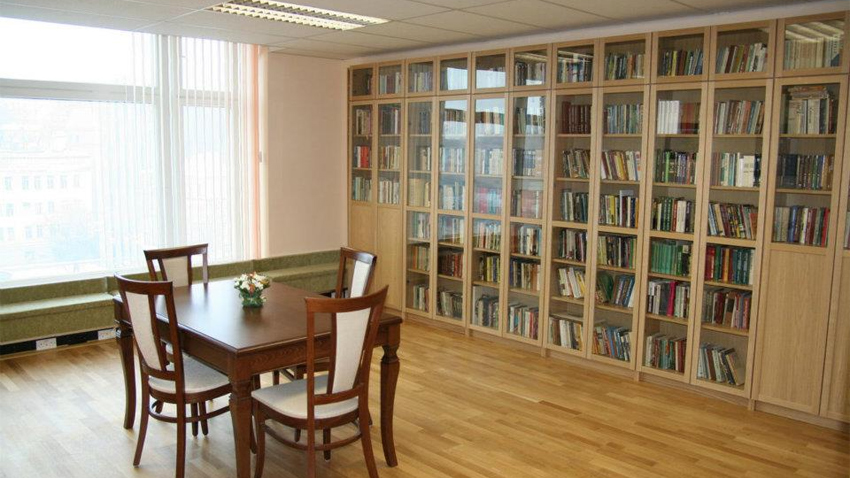For thirty years now, the Bulgarian Culture Institute (BCI) in Moscow has been carrying out its mission for promoting the Bulgarian cultural achievements in Russia. The institute was founded in 1988 when on 19 January the government of the two countries signed a special agreement. Since 2011, the center has been operating on the premises of M. I. Rudomino All-Russian State Library for Foreign Literature.

“The tradition of cultural ties is the most productive line for the development of bilateral relations between Bulgaria and Russia”, claims the Director of the Bulgarian Cultural Institute Pavel Vasev. This year when the two countries mark the 140th anniversary since the Russo-Turkish War of Liberation a program of events will be held in Moscow with Bulgarian participation.
“We can leave a good impression and promote the positions of Bulgarian culture not only with the cream of cultural achievement”, Pavel Vasev explains. “Therefore at the start of my term of office our team laid an emphasis on Bulgaria’s national cultural institutions and of course on other things too. In the course of two years – together with Academician Plamen Kartalov, we worked for a guest appearance of the Sofia Opera House with The Ring of the Nibelungby Richard Wagner and with two ballet shows scheduled for the time slot from 12 to 24 May. Of course, there are other events that have been the focus of a few years of work. Recently, we received in Moscow the Director of Bulgaria’s National History Museum, Assoc. Prof. Dr. Boni Petrunova. The museum is about to sign an agreement with Tretyakov Gallery and from 6 July till end-September the gallery is expected to put on display exceptional samples of the Bulgarian school of icon-painting – icons from 14th to 16th centuries.”
Speaking about events that BCI is going to accentuate in 2018, Pavel Vasev also highlighted the film program that Bulgaria’s National Film Center and Mosfilm have been preparing for the 140th anniversary of the end of the Russo-Turkish War that resulted in the liberation of Bulgaria. Screenings will be hosted by the Tretyakov Gallery at the beginning of March.
“Films on show will include Time of Violence, Heroes of Shipka, /a Russian-Bulgarian production/ and Julia Vrevskaya directed by Nikola Korabov. Korabov was trained by representatives of the Russian school of theater and we found in their film archives a very good copy of his film Freedom or Death dedicated to the self-sacrifice of Hristo Botev. This film has not been screened in Bulgaria but was distributed in Russia and there are a few copies of it with good quality dubbed in Russian.”
“I must mention a very good exhibition of the State Historical Museum of Russia with the participation of the Pleven Museum of Military History with about 70 items on display. It is important to say that last year – after an absence of 10-15 years from the Moscow Book Fair we presented a few Bulgarian publishing houses. Our display was entitled O Pismenyah (Of Letters) and it aimed to defend the Bulgarian origin of the Cyrillic and Glagolitic alphabets showing the literary activity of Bulgarian monasteries and churches.”

Contemporary Bulgarian literature has also been trying to reach more Russian readers. Over the past four years BCI in Moscow has supported the publishing of two or three Bulgarian novels translated to Russian.
“The latest tittles that we count on are Viktor Paskov’s A Ballad for Georg Henig, and Thrown into Nature and Toddler Murders by Milen Ruskov. They will be released in mid-2018”, said Pavel Vasev and added that one major difficulty is the lack of translators.
Otherwise, there is interest in the Bulgarian language in Russia – it is a fact that the major Bulgarian Philology is studied in several universities. The Bulgarian Cultural Center also organizes Bulgarian language courses:
"They are a very good tradition. Annually, about 120-130 trainees complete these courses and receive the respective certificates for different levels of language proficiency. Bulgarian language trainees have different backgrounds. Often these are people who own properties in Bulgaria and have decided to make a lasting contact with this country – I know a few such people. There are others who have scholarly interests and occupations or have family in Bulgaria and are motivated to learn the language”, concludes the Director of the Bulgarian Cultural Institute in Moscow Pavel Vasev.
English Daniela Konstantinova
Photos: Bulgarian Culture InstitutePeople with mental disabilities will share their unique perspective on Sofia's architectural heritage in the photographic exhibition "Architectural Stories from Old Sofia". It will be opened on November 1 in the Cultural Space of the Central Sofia Market..
Although they came with the calling to uplift our world, the chosen ones not only followed their predetermined path, but also risked not fully revealing themselves because of their sacred duty to the Fatherland. Among these Renaissance Bulgarians was..
The Plovdiv Jazz Festival is celebrating its tenth birthday this year with a program, both in the summer and autumn, featuring some of the biggest names in the world of jazz. The autumn edition will announce the second largest city in Bulgaria - Plovdiv,..
The Bogdan Khmelnitsky Melitopol State Pedagogical University, together with the Shumen University "Bishop Konstantin Preslavsky",..
"Bulgarians decorate the world," tells us Emilia Juеcker, who has been living in Germany for decades. The diversity of our cultural traditions,..
The second edition of the Festival of Bulgarians and Descendants of Bulgarians in Argentina will be held on November 30 at the San Juan Bosco School in..

+359 2 9336 661
